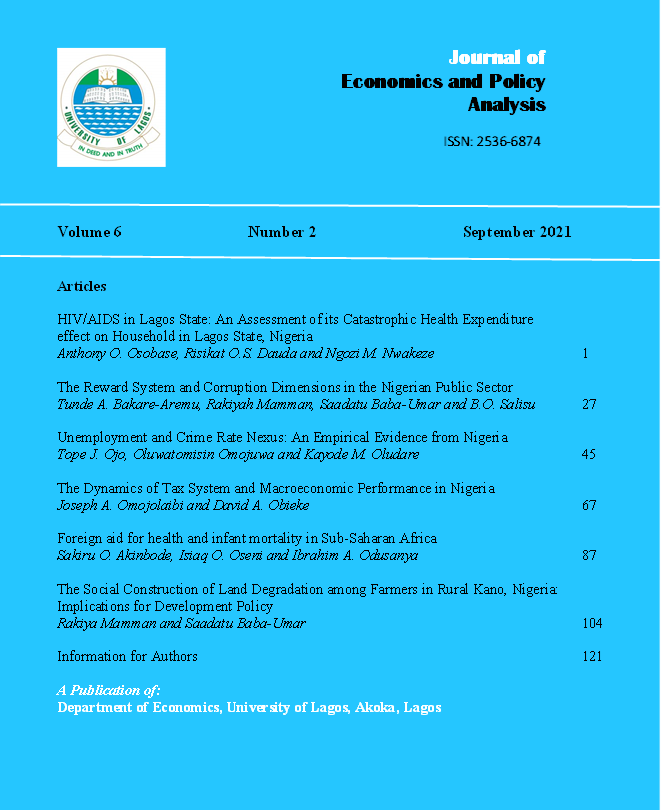The Reward System and Corruption Dimensions in the Nigerian Public Sector
Abstract
This study examine the possibility of establishing relationship between poor reward system in the Nigerian civil and public services (i.e. the civil and public servants) and the upsurge on the corruption level in the country. This is because the statutory minimum wage of thirty thousand naira (N30, 000) for the three tiers of government could hardly keep body and soul together, neither could this take home monthly salary actually takes anyone home. In addition the value of naira erodes with both inflation and depreciation (which I referred to as twin-arrow) which made an average Nigerian to be more vulnerable and socially insecure. Furthermore, the minimum wage could not last an average individual a fortnight for feeding and upkeep if one has to live slightly above the two dollar per day poverty line. Base on this argument this paper presents an empirical investigation to the aforementioned through a parametric research outlook, that is, an ex-ante research design that elucidates the behavioral disposition of target audience on the subject matter, which was thereafter analyzed with both descriptive and analytical tools of Chi-square to test the single hypothesis that Public reward system has nothing to do with the corruption level in Nigeria (.The ( was rejected at 0.05 level of statistical significance, and accept the alternative hypothesis. The rejection of the null hypothesis indicates that to a large extent poor reward system in Nigerian civil and public services contribute to sharp practices or corrupt practices, it equally confirms existence of both greed, and need based corruption. Therefore, the reward system should be improved upon through systematic and strategic pay roll system that incorporate all essential macroeconomic indices, such as inflation, depreciation and general price level, that will automatically adjust itself (payment of wages and salaries) to the current yearnings of the economy. This to a large extent will not only leads to effective and efficient service delivery but will also minimizes or eradicates the level of corruption in Nigeria.
References
Bakare-Aremu, T. A., & Adebanwa, A. A. (2014) An empirical examination of destructive impact of unemployment and corruption in a poverty ridden economy - The Nigerian experience, Yaba Journal of Management Science, 9(2), 24-33.
Bond, P. (2016). Persistent court corruption. Economic Journal, 118, 1333-1353.
Chen, C.X., & Sandino, T. (2012). Can wages buy honesty: The relationship between relative wages and employee theft. Journal of Accounting Research, 50(4), 967-1000.
Esione, U.O, Osita, F.C, & Chigbo D.N. (2020). Effect of reward on performance of workers in Nigeria public sector. International Journal of trend in scientific Research and Development, 4(2), 409-424.
Folorunso, B. A. (2007). Determinants and effects of corruption on investment, general price level and sustainable economic growth in Nigeria. International Journal of Semantic Research, 2(7), 123-134.
Gagliarducci, S., & Nannicini. T. (2011). Do better paid politicians perform better? Disentangling Incentives from Selection. Journal of the European Economic Association, 11 (2), 369-398.
Igbokwe, P.I. (2017). Similarities and difference in the Nigeria civil service reforms. International Journal of Humanities and Social Science, 7(6), 158-170.
Michael, S.A., Hassan, A., Chukwurah, D.C.J., & Joy, U.A. (2019). Reward system in the Nigerian political and public sector: The call for a paradigm shift in the 21st century. International Journal of Learning & Development, 2(5), 154-166.
Murana, A.O., Salahu, M.O., & Ibrahim, B.O. (2016). The impact of the Nigeria civil service reforms on effective service delivery. International Journal of Politics and Good Governance, 1(7), 1 – 20.
NSIWC, (2021). National Salaries, Incomes and Wages Commission (NSIWC) Annual Publication.
Osawe, C.O. (2014). Reengineering professionalism in Nigeria public service toward service delivery. Review of Public Administration and Management, 3(6), 63-75.
Panizza, U. (2001). Public sector wages and bureaucratic quality: Evidence from Latin America. Economía, 2(5), 97–151.
Pilapitiya, T. (2014). The impact of corruption on the human rights based approach to development. United Nations Development Programme Oslo Governance Centre, The Democratic Governance Fellowship Programme.
Promise, A.K.A. (2011). Minimum wage in Nigeria: Challenges and human resources practitioners intervention. NJLIR, 5(3), 1-7.
Tella, R., & Savedoff, W.D. (2011). Diagnosis corruption: Fraud in Latin America’s Public Hospitals. Inter-American Development Bank: Washington, DC.
Treisman, D. (2017). What have we learned about the causes of corruption from ten years of cross-national empirical research. Annual Review of Political Science, 9(10), 211-244.
Usman, D.U. (2016). Assessment of the implementation of 1972 Udoji’s and 2003 Obasanjo’s public service reforms in Nigeria: A neo–public management paradigm. Journal of Economics and Sustainable Development, 1(10), 178 – 187.
Wraith, R., & Simpkins, E. (1963). Corruption in developing countries. London: Allen and Unwin.


